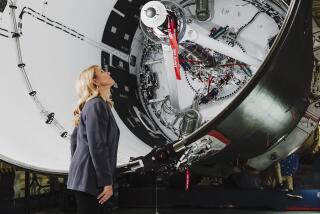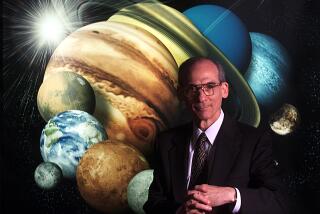Maxwell Hunter II, 79; Pioneer Rocket Scientist
- Share via
Maxwell W. Hunter II, one of the world’s leading rocket designers and space engineers who helped design Nike, Thor and other missiles during the Cold War and was a leading proponent of a space-based laser defense program and other visionary ideas, has died. He was 79.
Hunter, who was program manager for the Hubble Space Telescope during the creation phase of its design at Lockheed Missiles and Space Co., died Nov. 10 of complications from pneumonia in San Carlos, Calif.
A pioneer rocket scientist whose career spanned five decades, Hunter joined Douglas Aircraft in 1944.
As chief missile design engineer, he was responsible for the design of the Thor, Nike-Zeus and other missiles. And as chief engineer of space systems, he was responsible for all Douglas space efforts, including the Delta launch vehicle and the Saturn S-IV stage of the Apollo moon rocket program.
In 1962, Hunter joined the staff of the National Aeronautics and Space Council in Washington, D.C., which was created at the same time as the National Aeronautics and Space Administration four years earlier to coordinate interagency air and space activities.
As an advisor to Presidents Kennedy and Johnson, he offered insight into future space programs and the creation of the National Space Policy.
Returning to designing in 1965, Hunter began his 22-year association with Lockheed Missiles and Space Co. in Sunnyvale, Calif., where he worked in several areas, including the astronautics (rocket) division and the advanced development section.
At Lockheed, he was responsible for the design of the Advanced Space Transportation Vehicles StarClipper and Shuttle, and he originated the concept of using large expendable tanks in shuttle designs.
Hunter was in the forefront as an advocate of advanced space systems, such as the space-based laser defense program and a nuclear-powered spacecraft.
“He was a visionary as an engineer and received widespread recognition throughout the industry and NASA as a forward thinker,” said Steve Tatum, a spokesman for Lockheed Martin Missiles and Space Operations in Sunnyvale. “He led the proposal that won the Hubble Space Telescope for Lockheed and was a major proponent for a reusable single-stage orbit vehicle.”
“Max was one of the real pioneers,” said Roger Launius, NASA’s chief historian. “He spans the history of space flight literally from the dawn of the Space Age until his death. He was involved in virtually every major launch vehicle that was developed in the United States in some form or another and had revolutionary ideas that in some cases found their way into the technology and in some cases we have yet to try them out.”
Born in Hollidaysburg, Pa., on March 11, 1922, Hunter received a bachelor’s degree in physics and mathematics from Washington and Jefferson College in Washington, Pa.
After earning a master’s degree in aeronautical engineering from Massachusetts Institute of Technology in 1944, he went to work at Douglas Aircraft in Santa Monica, where he first worked on experimental versions of the company’s B-42 and B-43 bombers before entering the missile field.
Hunter, who retired from Lockheed in 1987, was a recipient of the National Space Society’s Werhner von Braun Memorial Award for “lifelong contributions to the field of rockets, missiles and spaceflight.”
He was the author of “Thrust Into Space,” a rocket propulsion textbook, and five dozen technical papers, including “Are Technological Upheavals Inevitable?”
“This man did so much,” said Irene Manning Hunter, Hunter’s wife of 37 years, a former movie actress whose credits include “Yankee Doodle Dandy. “I only made people happy being a movie star, but he changed the world.”
In addition to his wife, Hunter is survived by three sons, David of Los Angeles, Matthew of San Francisco and Max of Hollidaysburg; two daughters, Peggy Schafer of Pleasanton, Calif., and Sally Wiley of Evanston, Ill.; and five grandchildren.
More to Read
Sign up for Essential California
The most important California stories and recommendations in your inbox every morning.
You may occasionally receive promotional content from the Los Angeles Times.












